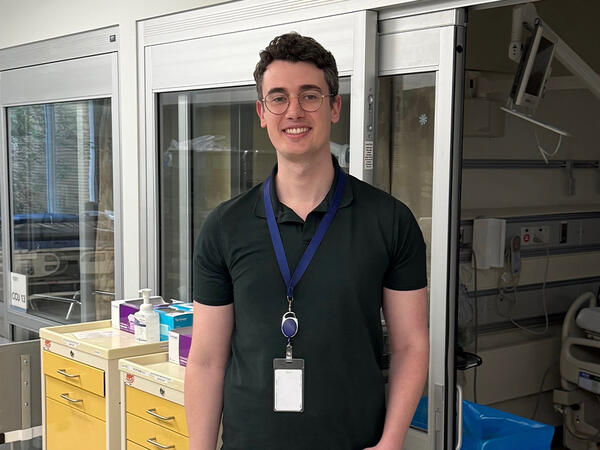Chukwunonso Nwabufo and Reina Bendayan apply expertise in pharmacokinetics of HIV therapies to examine new and repurposed drugs for COVID-19
In early 2020, researchers and clinicians were desperate to find treatments for the new coronavirus spreading around the globe. They rapidly tested several pre-existing antiviral drugs to treat COVID-19, with varying degrees of success, and only remdesivir was approved for use in COVID-19 patients requiring hospitalization.
“But with rapidity comes the possibility of missing out on critical components, including clinical pharmacology,” says Chukwunonso Nwabufo, a PhD student and CIHR Scholar at U of T’s Leslie Dan Faculty of Pharmacy. “At this stage, it’s a reasonable time to start revisiting some of these drugs. Are we really using these drugs optimally? Could they offer more clinical benefits?”
Nwabufo and his supervisor, Professor Reina Bendayan, recently published an opinion article in Trends in Pharmacological Sciences that outlines key recommendations for developing or repurposing drugs for COVID-19 that consider the critical questions of how drugs are taken up and metabolized by cells in organs affected by the virus, especially when there is severe inflammation. These drug-processing proteins coupled with the inflammatory response associated with the SARS-CoV-2 virus may prevent COVID-19 drugs from reaching optimal therapeutic concentrations at disease target sites.
Bendayan’s research program focuses on the enzymes and transport proteins that regulate the movement of drugs into cells. Before the pandemic, her research was focused on treatments for HIV, and in the past two years, she has applied her expertise in pharmacokinetics to study the challenges associated with drugs for COVID-19.
Nwabufo began his PhD studies with the Bendayan lab in 2021 after working at Gilead Sciences, where he was involved with research into antiviral drugs and worked on the development of remdesivir for treating severe COVID-19. This experience made him curious about why antiviral drugs that showed some benefits in preclinical work did not translate into positive results at the population level, and he became interested in the importance of understanding the interactions between the changes in the body that occur due to disease and pharmacokinetics – how drugs are absorbed, distributed, and used in the body – for COVID-19 drugs.
“We have to look at the pharmacokinetic profile of COVID-19 drugs in the lung to see how the drug is distributed and concentrated at the primary pulmonary cells of SARS-CoV-2 infection,” says Nwabufo. “Pharmacokinetics is very important – ultimately it informs the dosing regimen, how effective the drug is, and how long it may take to see efficacy.” However, using the pharmacokinetic profile of the drug in the blood as a stand-in to represent pharmacokinetic profile in the lung can be misleading, and it may help explain the limited efficacy seen for several antiviral drugs for COVID-19.
Inflammation could be changing drug activity in the lung
In the opinion paper, Nwabufo and Bendayan write that drug developers need to carefully consider the pharmacological factors that affect drug concentration at the affected tissue sites. They also write that the inflammation so common in severe COVID-19 may actually disrupt the pharmacokinetics of the drugs and affect how patients respond.
To overcome these challenges, they recommend developing drugs that have both anti-inflammatory and antiviral effects to mitigate potential changes in drug pharmacokinetics that may occur in patients with active viral replication and severe inflammation. They also recommend incorporating precision medicine when treating COVID-19 patients to reduce or prevent differences in drug response that may arise from individual variations in how SARS-CoV-2 infection affects drug processing in the body.
“Looking at the clinical pharmacology – how drugs are processed and used by the body – is so important to understand why a drug works or doesn’t and if it can be combined with another to improve its safety and efficacy,” says Nwabufo. “We also have to pay attention to the possibility that the disease itself – the inflammation and tissue damage – is having an effect on the drug’s safety and efficacy.”
Bendayan’s lab has also been looking at this question of whether SARS-CoV-2 infection interacts with drug metabolizing enzymes and drug transport proteins in lung tissues of COVID-19 patients. They recently presented data at the 2022 American Association of Pharmaceutical Sciences (AAPS) PharmSci360 conference demonstrating that SARS-CoV-2 infection dysregulated the expression of specific drug transport proteins and metabolizing enzymes, which could impact the safety and efficacy of drugs used to treat COVID-19, including remdesivir.
Nwabufo says that the recommendations in their article are meant to help drug developers understand why they may not have seen the expected effects of certain antiviral drugs, encourage them to revisit some of the candidates that were abandoned early on, and further optimize approved drugs to unleash their optimal benefits.
“We can now potentially unravel some of the questions surrounding the inefficacy of many of the COVID-19 drug candidates or determine optimal dosing for the drugs that were approved. And some of the drugs that were recalled initially could be re-examined with their pharmacology in mind,” says Nwabufo. “People are still being infected with COVID-19, and we don’t have a cure. Maybe now is the time to revisit some of these questions and look for answers that can help patients.”
More News
Image

Pharmacy alum’s research shows how full-scope practice improves cancer care
Honoured with a national award, Adrian de Boer says his residency experience was a powerful reminder that he's making a meaningful change to the pharmacy profession.
Read More
Image

Pharmacy alum passionate about helping community pharmacists practice to full scope
As a pharmacy leader at Rexall, Heidi Wittke uses frontline experience to lead initiatives that improve patient care
Read More
Image

Bridging Research and Industry: GRIP 2025 highlights innovation and real-world impact
Over 200 attendees from academia, healthcare, and industry gathered last week for the 2025 GRIP symposium, celebrating the depth and diversity of graduate student research.
Read More

